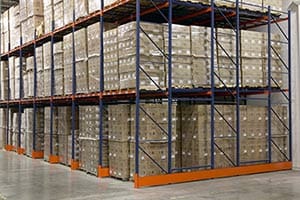Customized Solutions: Tailoring Industrial Racking Systems to Your Needs

Industrial racking systems play a crucial role in optimizing storage space and ensuring efficient operations in warehouses and manufacturing facilities. However, off-the-shelf racking solutions may not always meet the specific requirements of every business. To address this, customized racking solutions have become increasingly popular, offering tailored designs that cater to the unique needs of each individual operation.
The Importance of Customized Industrial Racking Systems
Off-the-shelf racking systems are standardized solutions that may not always be the best fit for every industrial facility. Customized racking solutions offer a range of benefits that can significantly improve the efficiency and effectiveness of storage operations:
- Maximized use of available space
- Optimized storage density
- Enhanced organization and accessibility
- Improved safety and security
- Increased durability and longevity
Factors to Consider When Customizing Industrial Racking Systems
1. Space Constraints
Consider the size and layout of your facility to determine the most efficient use of available space.
2. Inventory Requirements
Understand the characteristics of your inventory, such as size, weight, and storage conditions, to design racks that can accommodate your products effectively.
3. Accessibility Needs
Think about how often and how quickly you need to access different items in your inventory to design a racking system that allows for efficient retrieval.
4. Safety Regulations
Ensure that your customized racking solution complies with safety standards and regulations to create a secure working environment for your employees.
The Customization Process
Customizing industrial racking systems involves a structured process that begins with a thorough assessment of the specific needs and requirements of the facility. The customization process typically follows these key steps:
1. Consultation and Assessment
Meet with racking system experts to discuss your operational needs and constraints, allowing them to analyze the space and assess the requirements for your customized solution.
2. Design and Engineering
Based on the assessment, engineers will design a customized racking solution that addresses all the specific needs identified during the consultation phase.
3. Fabrication and Installation
Once the design is finalized, the fabrication process begins to create the customized racking components. Installation is carried out by professionals to ensure proper setup and structural integrity.
4. Testing and Certification
After installation, the customized racking system undergoes rigorous testing to ensure it meets safety and performance standards. Certification may be obtained to verify compliance with regulations.
Benefits of Customized Industrial Racking Systems
Investing in customized industrial racking systems offers a wide range of benefits that can positively impact your operations and bottom line:
- Maximized storage capacity
- Improved workflow efficiency
- Reduced operational costs
- Enhanced safety measures
- Scalability for future growth
Conclusion
Customized industrial racking systems are valuable assets that can transform the way your business manages its inventory and storage operations. By tailoring racking solutions to your specific needs, you can optimize space utilization, improve workflow efficiency, and enhance safety measures within your facility. Consider investing in customized racking solutions to unlock the full potential of your storage space and drive operational excellence.

